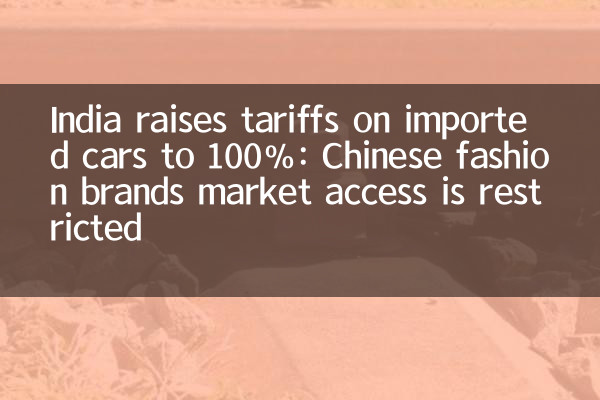India raises tariffs on imported cars to 100%: Chinese fashion brands market access is restricted
Recently, the Indian government announced that it would raise tariffs on imported cars from 60% to 100%, a policy change has attracted widespread attention from the global automotive industry. At the same time, the access of Chinese fashion brands in the Indian market has also been restricted, further intensifying the friction between China and India in the trade field. This article will analyze the impact of this policy on China-India trade based on the hot data of the entire network for the past 10 days.
1. Adjustment of tariff policy for imported cars in India

The Indian government raised tariffs on imported cars this time, aiming to protect the local automobile industry and reduce its dependence on imported cars. The following are the relevant data on India's imported automobile tariff policy in the past 10 days:
| date | Policy content | Range of impact |
|---|---|---|
| 2023-10-01 | Imported cars are increased from 60% to 100% | All imported car brands |
| 2023-10-03 | Shares of local automakers rose 5% | Tata Automobile, Mahendda, etc. |
| 2023-10-05 | Chinese auto brands' sales in printing fell by 30% | SAIC MG, Great Wall Motors, etc. |
2. Chinese fashion brands are restricted in the Indian market
In addition to the automotive industry, access to Chinese fashion brands in the Indian market is also restricted. The Indian government has strengthened scrutiny of products such as clothing and electronic products from China, making it difficult for many Chinese brands to enter the Indian market. The following are the relevant data of Chinese fashion brands in the Indian market in the past 10 days:
| date | event | Influence the brand |
|---|---|---|
| 2023-10-02 | Indian customs detain Chinese clothing goods | SHEIN, Zaful, etc. |
| 2023-10-04 | China's electronic product import approval delayed | Xiaomi, OPPO, etc. |
| 2023-10-06 | Sales of local fashion brands in India increase by 20% | FabIndia, Biba, etc. |
3. Background analysis of Sino-India trade frictions
There are multiple reasons behind India's hike of tariffs on imported cars and restricting access to Chinese fashion brands. First, the Indian government hopes to boost the economy by protecting local industries. Secondly, tensions between China and India on the border issue have also affected bilateral trade. In addition, India has implemented a "self-reliance" policy in recent years, trying to reduce its dependence on imported goods.
4. Future prospects
In the short term, India's high tariff policies may continue to affect the development of Chinese automobile and fashion brands in the Indian market. But in the long run, Chinese brands can evade tariff barriers by building factories in India or cooperating with Indian companies. At the same time, China and India are also expected to ease trade frictions through dialogue.
In general, India's policy adjustment this time is both a challenge and an opportunity. Chinese brands need to respond flexibly to remain competitive in the Indian market.

check the details

check the details